-
 Bitcoin
Bitcoin $84,705.5206
1.96% -
 Ethereum
Ethereum $1,882.8342
2.59% -
 Tether USDt
Tether USDt $0.9999
-0.02% -
 XRP
XRP $2.1020
-0.02% -
 BNB
BNB $603.8511
-0.82% -
 Solana
Solana $124.7702
-1.25% -
 USDC
USDC $0.9999
-0.01% -
 Dogecoin
Dogecoin $0.1717
1.76% -
 Cardano
Cardano $0.6717
0.25% -
 TRON
TRON $0.2380
0.73% -
 Toncoin
Toncoin $3.9856
-3.94% -
 Chainlink
Chainlink $13.7866
0.95% -
 UNUS SED LEO
UNUS SED LEO $9.4087
2.25% -
 Stellar
Stellar $0.2691
1.18% -
 Avalanche
Avalanche $19.3533
1.55% -
 Sui
Sui $2.3689
0.72% -
 Shiba Inu
Shiba Inu $0.0...01244
-1.74% -
 Hedera
Hedera $0.1666
1.40% -
 Polkadot
Polkadot $4.1088
0.73% -
 Litecoin
Litecoin $83.2182
-0.74% -
 MANTRA
MANTRA $6.2222
-1.29% -
 Bitcoin Cash
Bitcoin Cash $306.0723
0.08% -
 Bitget Token
Bitget Token $4.6091
0.13% -
 Dai
Dai $1.0000
0.02% -
 Ethena USDe
Ethena USDe $0.9999
-0.01% -
 Pi
Pi $0.6919
-3.31% -
 Hyperliquid
Hyperliquid $13.1957
-3.08% -
 Monero
Monero $219.3099
1.05% -
 Uniswap
Uniswap $6.1691
2.09% -
 Pepe
Pepe $0.0...07614
3.60%
How does the failure rate of mining motherboard affect mining revenue?
Mining motherboard failure directly impacts cryptocurrency mining revenue through downtime, repair/replacement costs, and potential data loss, significantly affecting profitability, especially in large-scale operations.
Mar 25, 2025 at 07:29 pm

How Does the Failure Rate of Mining Motherboards Affect Mining Revenue?
Mining cryptocurrency, particularly Bitcoin, involves specialized hardware, and the motherboard is a critical component. Its failure directly impacts the profitability of your mining operation. Understanding this relationship is crucial for optimizing your return on investment (ROI). A high failure rate translates to lost hashing power and, consequently, reduced revenue. The longer a motherboard is offline for repairs or replacement, the more cryptocurrency you miss out on mining.
The impact of motherboard failure isn't solely about the downtime. Repair costs, replacement expenses, and potential data loss add to the financial burden. The cost of high-end mining motherboards is significant, and frequent replacements can quickly erode your profits. Furthermore, the time spent troubleshooting and resolving these issues represents lost mining opportunities. Proactive maintenance and choosing reliable hardware are vital in mitigating these risks.
The type of mining operation significantly influences the impact of motherboard failure. A large-scale mining farm with hundreds of machines will experience a greater overall revenue loss from even a small percentage of motherboard failures compared to a smaller operation with only a few machines. This is due to the sheer scale of the operation and the cumulative effect of multiple failures. Therefore, large operations prioritize robust hardware and preventative maintenance strategies.
Motherboard failure rates are influenced by several factors. Overheating is a common culprit, leading to component degradation and eventual failure. Poor ventilation within the mining rig contributes to overheating. Using low-quality components or overclocking the system beyond its safe limits also increases the risk of failure. Finally, the age of the motherboard plays a crucial role; older motherboards are more prone to failures due to wear and tear.
Let's delve deeper into how specific aspects of motherboard failure affect mining revenue:
- Downtime: The most direct impact. Every hour a motherboard is down, mining revenue is lost. This loss is proportional to the hash rate of the failed machine and the current cryptocurrency price.
- Repair Costs: Repairing a faulty motherboard can be expensive, especially for specialized mining motherboards. This cost directly reduces your net profit. In some cases, repair might not be feasible, leading to a complete replacement.
- Replacement Costs: Replacing a motherboard involves significant upfront costs. The cost of a new motherboard, coupled with the downtime during the replacement, significantly impacts revenue.
- Data Loss: In rare cases, motherboard failure can lead to data loss, potentially affecting your wallet information and mining progress. This loss is difficult to quantify financially, but it can be devastating.
Choosing a reliable motherboard is paramount. Look for motherboards specifically designed for mining, with features like enhanced cooling solutions and robust power delivery systems. Regular maintenance, including cleaning and monitoring temperatures, is essential in preventing failures.
Investing in redundant systems can mitigate the impact of failures. Having backup motherboards readily available minimizes downtime. This redundancy comes at a cost, but the financial security it offers can outweigh the initial investment, particularly for larger operations.
The choice of mining software also plays a role. Effective monitoring software allows for early detection of potential issues, such as overheating or unusual power consumption, enabling timely intervention and preventing catastrophic failures.
Frequently Asked Questions:
Q: How can I reduce the risk of motherboard failure in my mining operation?
A: Implement preventative measures like proper ventilation, regular cleaning, monitoring temperatures, and avoiding overclocking. Choose high-quality, mining-specific motherboards and consider investing in redundant systems.
Q: What is the average lifespan of a mining motherboard?
A: The lifespan varies significantly based on usage, quality, and environmental conditions. However, expect a shorter lifespan compared to general-purpose motherboards due to the intense workload.
Q: Can insurance cover motherboard failures in a mining operation?
A: Some specialized insurance policies might cover equipment failures in a mining operation, but this isn't always standard. It's crucial to check with insurance providers to understand their coverage options.
Q: How do I calculate the revenue loss due to a motherboard failure?
A: Calculate the lost hash rate during downtime, multiply it by the average block reward and the cryptocurrency price, and consider the repair/replacement costs. This calculation is complex and requires detailed records of your mining operation.
Q: Are there specific motherboard brands known for higher reliability in cryptocurrency mining?
A: Several motherboard manufacturers focus on producing durable and high-performance boards for mining. Researching reviews and comparing specifications before purchasing is essential. However, no brand guarantees zero failures.
Q: What is the role of BIOS settings in preventing motherboard failures?
A: Properly configured BIOS settings, particularly those related to power management and fan control, can significantly impact motherboard longevity and reduce the risk of overheating.
Q: How often should I perform maintenance on my mining motherboards?
A: Regular maintenance is crucial. Aim for weekly inspections of temperatures and cleaning of dust buildup, and more thorough checks monthly. This proactive approach can prevent minor issues from escalating into major failures.
Disclaimer:info@kdj.com
The information provided is not trading advice. kdj.com does not assume any responsibility for any investments made based on the information provided in this article. Cryptocurrencies are highly volatile and it is highly recommended that you invest with caution after thorough research!
If you believe that the content used on this website infringes your copyright, please contact us immediately (info@kdj.com) and we will delete it promptly.
- Santiment Released Data Offering Insights for Spotting Market Dips
- 2025-04-02 11:35:12
- Have You Ever Wondered What It Would Be Like to Invest in the Next Big Meme Coin Before It Skyrockets?
- 2025-04-02 11:35:12
- Circle, the company behind the USDC stablecoin, has filed for an initial public offering and plans to list its shares on the New York Stock Exchange
- 2025-04-02 11:30:12
- Circle, the company behind USDC stablecoin, has filed for an initial public offering and plans to list on the New York Stock Exchange
- 2025-04-02 11:30:12
- Circle, the company behind the USDC stablecoin, has filed for an initial public offering and plans to list on the New York Stock Exchange.
- 2025-04-02 11:25:12
- Hyperliquid's Centralized Twist Exposes the Paradox of Decentralized Finance
- 2025-04-02 11:25:12
Related knowledge

What is DeFi mining and how is it different from traditional mining?
Apr 02,2025 at 09:50am
DeFi mining, also known as yield farming or liquidity mining, is a process within the decentralized finance (DeFi) ecosystem where users provide liquidity to decentralized platforms in exchange for rewards. Unlike traditional mining, which involves solving complex mathematical problems to validate transactions and add them to a blockchain, DeFi mining f...
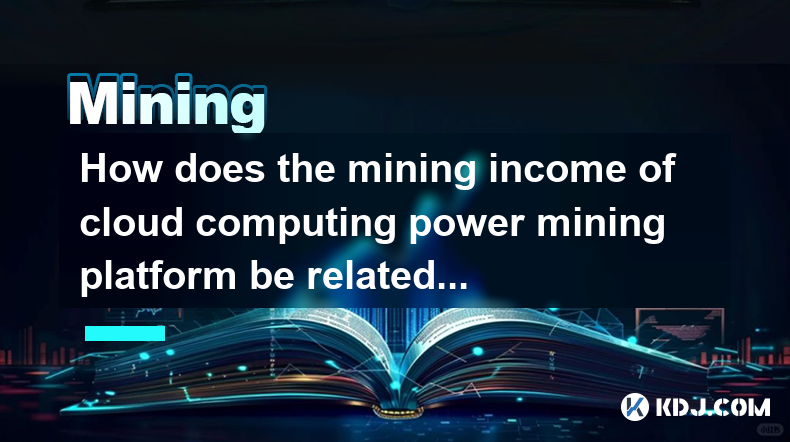
How does the mining income of cloud computing power mining platform be related to mining pool allocation?
Apr 02,2025 at 01:56am
The relationship between the mining income of a cloud computing power mining platform and the allocation of mining pools is a crucial aspect of cryptocurrency mining. Mining income is influenced by various factors such as the efficiency of the mining hardware, electricity costs, and the specific cryptocurrency being mined. However, the allocation of min...
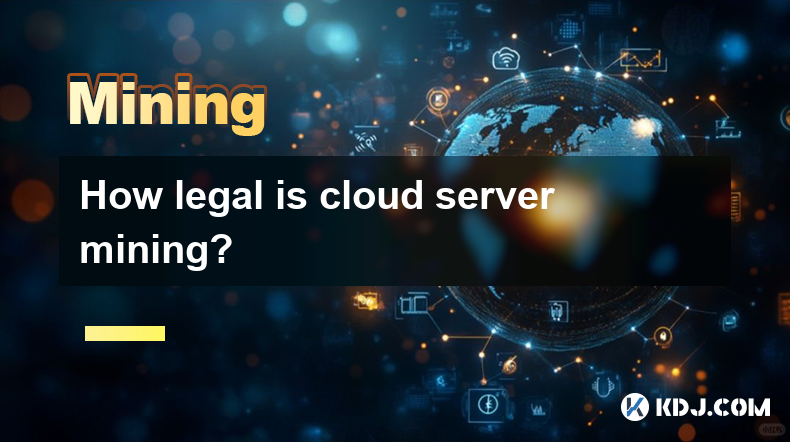
How legal is cloud server mining?
Apr 01,2025 at 08:08am
Cloud server mining has become an increasingly popular method for individuals and companies to participate in cryptocurrency mining without the need for expensive hardware and high electricity costs. However, the legality of cloud server mining can be a complex issue, as it varies by jurisdiction and depends on several factors. This article will explore...
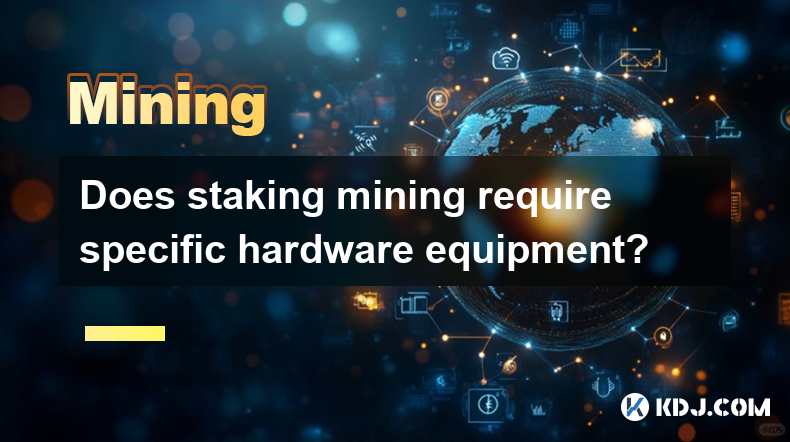
Does staking mining require specific hardware equipment?
Apr 02,2025 at 08:21am
Staking mining, often referred to simply as staking, is a process used by various cryptocurrencies to secure their networks and validate transactions. Unlike traditional mining, which often requires specialized hardware like ASICs (Application-Specific Integrated Circuits) or high-performance GPUs (Graphics Processing Units), staking typically does not ...
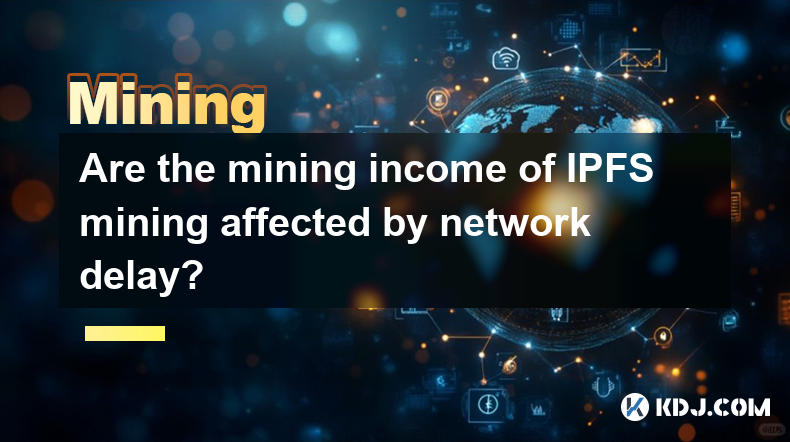
Are the mining income of IPFS mining affected by network delay?
Apr 01,2025 at 09:36pm
Are the Mining Incomes of IPFS Mining Affected by Network Delay? Understanding IPFS Mining and Network Delay's ImpactIPFS (InterPlanetary File System) mining, unlike Bitcoin mining, doesn't involve solving complex cryptographic puzzles. Instead, it focuses on providing storage and bandwidth to the network. Miners earn rewards for storing and sharing dat...
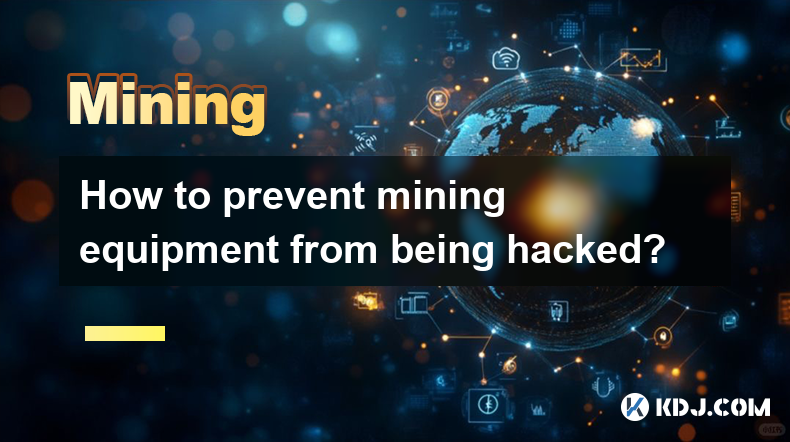
How to prevent mining equipment from being hacked?
Apr 01,2025 at 06:22am
Understanding the ThreatsCryptocurrency mining, while potentially lucrative, exposes your equipment to various cyber threats. These threats range from simple malware infections that steal your mining profits to sophisticated attacks that hijack your entire operation. Understanding these threats is the first step in effective protection. This includes r...

What is DeFi mining and how is it different from traditional mining?
Apr 02,2025 at 09:50am
DeFi mining, also known as yield farming or liquidity mining, is a process within the decentralized finance (DeFi) ecosystem where users provide liquidity to decentralized platforms in exchange for rewards. Unlike traditional mining, which involves solving complex mathematical problems to validate transactions and add them to a blockchain, DeFi mining f...

How does the mining income of cloud computing power mining platform be related to mining pool allocation?
Apr 02,2025 at 01:56am
The relationship between the mining income of a cloud computing power mining platform and the allocation of mining pools is a crucial aspect of cryptocurrency mining. Mining income is influenced by various factors such as the efficiency of the mining hardware, electricity costs, and the specific cryptocurrency being mined. However, the allocation of min...

How legal is cloud server mining?
Apr 01,2025 at 08:08am
Cloud server mining has become an increasingly popular method for individuals and companies to participate in cryptocurrency mining without the need for expensive hardware and high electricity costs. However, the legality of cloud server mining can be a complex issue, as it varies by jurisdiction and depends on several factors. This article will explore...

Does staking mining require specific hardware equipment?
Apr 02,2025 at 08:21am
Staking mining, often referred to simply as staking, is a process used by various cryptocurrencies to secure their networks and validate transactions. Unlike traditional mining, which often requires specialized hardware like ASICs (Application-Specific Integrated Circuits) or high-performance GPUs (Graphics Processing Units), staking typically does not ...

Are the mining income of IPFS mining affected by network delay?
Apr 01,2025 at 09:36pm
Are the Mining Incomes of IPFS Mining Affected by Network Delay? Understanding IPFS Mining and Network Delay's ImpactIPFS (InterPlanetary File System) mining, unlike Bitcoin mining, doesn't involve solving complex cryptographic puzzles. Instead, it focuses on providing storage and bandwidth to the network. Miners earn rewards for storing and sharing dat...

How to prevent mining equipment from being hacked?
Apr 01,2025 at 06:22am
Understanding the ThreatsCryptocurrency mining, while potentially lucrative, exposes your equipment to various cyber threats. These threats range from simple malware infections that steal your mining profits to sophisticated attacks that hijack your entire operation. Understanding these threats is the first step in effective protection. This includes r...
See all articles






















































































